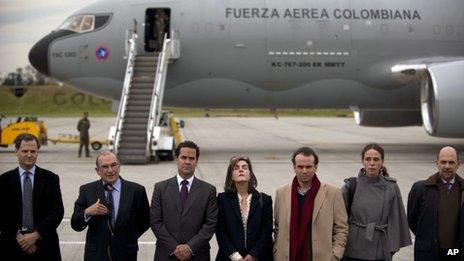Colombia and Farc negotiators in Oslo for peace talks
- Published

Representatives of the Colombian government and the left-wing Farc rebel group are in Oslo for their first direct negotiations in 10 years.
The talks are aimed at ending nearly five decades of conflict.
The two delegations arrived in the Norwegian capital on Wednesday and were due to have a preliminary meeting to discuss technical issues.
They will each hold a news conference at 15:00 local time (13:00 GMT) to launch the talks.
But officials in Norway warned that the negotiations will be carried out in a climate of secrecy, without regular media updates.
The talks are due to carry on for months, proceeding in Cuba at a later stage.
The chief government negotiator, Humberto de la Calle, told reporters as he left from a military air base in Bogota that he was hopeful.
"We don't want to create false expectations but we do believe there are structural elements that allow us to hope that we will bring back good news for Colombia," he said.
The Farc delegation flew from Cuba.
Farc disagreements
The timetable for the talks has been put back several times because of logistical problems, including bad weather in Colombia.
The Farc (Revolutionary Armed Forces of Colombia) is the country's oldest and largest guerrilla group. It has been fighting the state since 1964.
Representatives for the two sides have been in Havana, together with Norwegian and other diplomats, preparing for the talks.
Among the reported reasons for the talks and news conference being pushed back were delays in getting arrest warrants for Farc representatives suspended, and disagreements over the make-up of the Farc delegation.
The Farc originally set out to overthrow the government and install a Marxist regime, but in recent years has become increasingly involved in the drug trade to raise money for its campaign.
It is thought to have some 8,000 fighters, down from about 16,000 in 2001.
Colombian President Juan Manuel Santos has rejected rebel calls for a ceasefire, saying military operations would continue until a final agreement is reached.
- Published15 October 2012
- Published24 September 2015
- Published29 August 2013
- Published27 May 2013
- Published18 October 2012
- Published13 September 2012
- Published4 September 2012
- Published28 August 2012